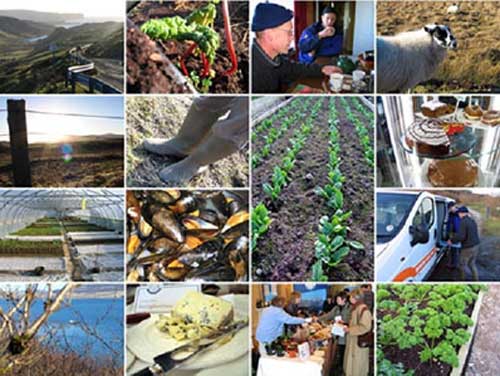THE LOCAL FOOD LINK VAN GROUP

Distribution of local food produce to local communities (instead of wholesalers from mainland) increases economy on the island of Skye.
Key Innovation
Providing income to small communities through local food produce
Problematic background and context
bringing fresh locally produced food to the tables of skye & lochallch” as many other islands in scotland, the distribution of goods in an ongoing and widely recognised problem for many local food producers. the problem is presented through the fact that food distribution is made difficult due to the large distances between producers, retailers and consumers, that seperate them from each other. the result is a decreased availability of local food produce on the island. with the aim to improve on this situation, the food link van was initiated on a voluntary base in 2000, with a try out period of 6 months. following its success, the food link skye and lochalch Ltd (food link Ltd.) was incorporated in 2003 as a non-profit making company, to manage the award winning foodlink van and secure its future as a viable local distribution service.
Solution description
skye and lochalsh food link, the food link group, is a volontary association of local producers, caterers, retailers abd consumers with an interest in promoting fresh, locally produced food. a shared van links the network through which to distribute local produce all over the island. the problem is presented throught he fact that local producers often struggle to efficiently distribute their goods to the customers spread all over the island as they usually live in rural surroundings, very remote and distanced from each other. at the same time local produce is valued high by the community of skye, hence the ideal of a solution that provides a local food distribution service. the local link van group was intiated in april 2000 by a couple of local producers that came together. they decided that instead of having to deliver evry produce thenselves , they would introduce the van which would drive a set up route twice a week, pick up the orders from the producer and deliver them to their customers. by doing so, not only one could save on petrol/ van activities but also ensure the delivery of local produce that circulate all over the island, creating a more sustaionable community. the solution not melery ensures the future of local food producers as well as the distrubution of their goods but promotes overall important aspects of economic and environemental community life and the health benefits of locally grown fresh produce.
Timeframe
the food link van has been on the road since april 2000 and within the last 5 years they have vastly increased the amount of local produce staying within skye and lochalch from £ 8,500 to over £60,000.
Development phase
Diffusion:
The Food Link Van has been on the road since April 2000 and within the last 5 years they have vastly increased the amount of local produce staying within Skye and Lochalch from £ 8,500 to over £60,000.
Maturity:
the van group incorporates approximately 15 producers and about 40 customers spreat all over the island. in 2003, they received funding to expand the food link group and community buisness to the food link skye & lochalch Ltd. this allowed the group to purchase a larger van which enabled them to deliver even more produce and help the van to become self-sufficient. at present, the van runs on tuesday and friday, normally between march and october. more recnlty, the group has been awarded funding for a marketing ordinator to develop the work of the food link group and keep the network growing.
Revenue/costs model
the customers pay the price of the produce they order. 10 % levy value of the goods are paid by the producer to go into the company. this money is used for petrol, van maintenance and pays the wages of the van driver and the marketing co-ordinator. there are no shareholders and all profits are reused within the company.
Social evaluation
The Food Link Group aims to build strong sustainable networks between local producers and consumers in order to stimulate local food production. They believe that there are sound economic, environmental, health and community benefits to be gained from sourcing food directly from where it is produced. The Skye environment is said to produce some of the best quality food in Britain, free from pollution, genetic modification and other harmful substances.
Environmental evaluation
The use of one shared vehicle clearly minimises aspects of congestion and pollution. Detrimental environnmental impacts of conventional agribuisnesses can be avoided through the promotion of small scale local production that underpins the notion of healthy and communal living on the island.
Economical evaluation
Making such high quality food available to local people and visitors encourages aspects of local and family economy and ensures the future of sustainable agriculture on skye.
Authors
Ian Grout / The Glasgow School of Arts / United Kingdom